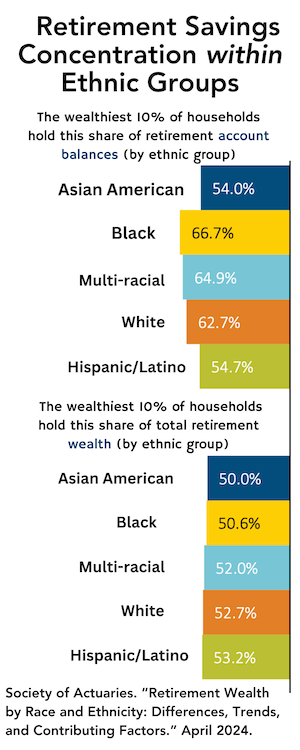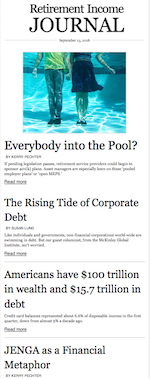Not only should retirement investors not worry about rising interest rates, writes Maine-based actuary Joe Tomlinson in a paper recently published at Advisorperspectives.com, “A rise in interest rates is actually good for retirement portfolios.”
In his timely and reassuring article, “Retirement Portfolios: Fears over Rising Rates are Overblown,” Tomlinson describes hypothetical owners of a Vanguard TIPS fund to show how, over a 25-year retirement, a rise in interest rates and a drop in fund value today actually gives the owners a higher income each year in retirement. Here’s his example:
Let’s consider a hypothetical couple who set aside $560,000 on March 31, 2013, to provide retirement withdrawals to supplement their Social Security income, with a goal of having that fund last 25 years. They decide to invest in the Vanguard TIPS [Treasury Inflation-Protected Securities] fund and work with their advisor to develop projections to set up a withdrawal schedule.
The projections use a yield after inflation of negative 0.84%, based on the March 31, 2013, 10-year TIPS yield of negative 0.64%, less 0.2% for expenses. They determine that pre-tax withdrawals of $20,000 annually (with increases each year for inflation) would last 25 years, based on the fund’s composition.
Three months pass, interest rates increase and their quarterly statement shows they are off to a bad start. The fund has lost 7.34% (from the chart above), and their $560,000 has been reduced by $41,000 to $519,000. They decide to redo their projections and now use an updated yield of 0.28%.
They are pleasantly surprised to discover that, even though they are starting with $41,000 less, they now have projected money left over after 25 years. They determine that an increase in withdrawals of 7.5% to $21,500 is now consistent with the fund lasting 25 years.
Anyone nearing retirement long on bonds (I raise my hand) should find Tomlinson’s analysis comforting. But it sounds almost too good to be true. If the yield goes up, does that really help the current shareholder? (The fund’s posted yield on any given day is, according to Vanguard, its holdings’ average yield-to-maturity over the last 30 days.) According to Vanguard, it does—to the extent that the fund manager reinvests each day’s dividends at lower prices and higher yields. There’s a catch, of course. You have to hold the fund long enough so that your buying-the-dips strategy recovers your loss of principal. And that could take a while.
But Tomlinson’s investors have time. He’s not measuring success in terms of recovering principal in a hurry. He’s measuring success by the income potential (in years and dollars) of the bond fund assets over 25 years.
To see if I could replicate something akin to Tomlinson’s findings, I used a calculator at Yahoo.com that’s designed to answer the practical question: “How long will my money last with systematic withdrawals?” My hypothetical investor was a 65-year-old on the verge of retirement who owns 50,000 shares of Vanguard Total Bond Market Index Fund.
On January 1, 2013, this investor’s 50,000 shares were worth $553,000. On July 18, 2013, their market value was just $533,000, for a 3.6% decline. Over the same period, however, the fund’s yield had risen to 2.01% from 1.59%. (The fund’s annual expense ratio of 10 basis points is ignored here.)
I plugged these numbers into the Yahoo calculator. My findings were a bit closer to a wash than Tomlinson’s. First I ran the numbers for the higher-principal, lower-yield scenario. According to the Yahoo calculator, if someone in the 25% tax bracket with $553,000 in a fund that earned 1.59% a year were to withdraw $1,667 a month (~$20,000/year) and increased the withdrawal each year by 2% to keep pace with inflation, the money would last 25.0 years and pay out a cumulative $647,705. Then I ran the numbers for the lower-principal, higher-yield scenario. All else being equal, someone with $533,000 and a 2.01% yield could withdraw $1,675 a month and see the money last 25.0 years for a cumulative payout of $649,941.
What if prices kept falling and yields kept rising? They would probably keep balancing out for the investor—at least, I presume, until his time horizon became shorter (roughly speaking) than the duration of the bond fund.
My results, like Tomlinson’s, suggest that the millions of near-retirees who own lots of shares of bond funds shouldn’t panic when they hear that bond yields are rising. So why does the media report on bonds so anxiously, with simultaneous wailing over low yields and falling prices? Maybe it’s because bond news is always either bad for somebody, depending on whether she owns individual bonds or bond funds, is accumulating or decumulating, and has a long or short time horizon. In Tomlinson’s article, he’s talking specifically about people who are decumulating over 25 years, and his findings seem to be mostly positive for them.
So far we’ve been talking about a systematic withdrawal strategy. Let’s not overlook the annuity option. If my hypothetical investor wants the highest possible income from his bond-invested savings for as long as he lives, he should price an income annuity for comparison.
In this case, an annuity might be better than a bond fund. According to immediateannuities.com, my hypothetical retiree could get the same income as his bond fund provided (about $1,667) from a joint and survivor fixed income annuity—with an installment refund to beneficiaries—for $350,000, leaving him 183,000 for growth, inflation protection, bequest funding, charity, travel or a long-term care annuity hybrid. Annuities aren’t necessarily the answer; there are as many ways to solve the retirement income puzzle as there are clients. These represent just a small sample.
© 2013 RIJ Publishing LLC. All rights reserved.


